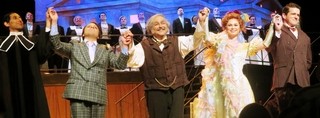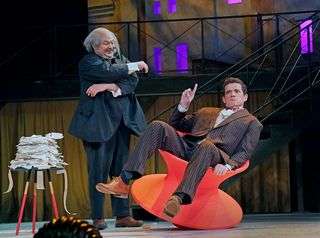|
Back
The Unlikely Art of Opera Buffa Albany
Great Barrington (Mahaiwe Performing Arts Center)
08/24/2019 - & August 27, 30, 2019
Gaetano Donizetti: Don Pasquale
Craig Colclough (Don Pasquale), Emmett O’Hanlon (Doctor Malatesta), Deanna Breiwick (Norina), Matthew Grills (Ernesto), Siddharth Dubey (A notary)
Berkshire Opera Orchestra and Chorus, Brian Garman (Conductor)
Jonathon Loy (Stage Drector), Stephen Dobay (Scenic Designer) Alex Jainchill (Costume Designer), Beckie Kravetz (Hair and Makeup Designer), Stephen Agisilaou (Choreographer)

S. Dubey, M. Grills, C. Colclough, D. Breiwick, E. O’Hanlon
(© Samuel A. Dog)
“For an old man he is old, for an old man he is grey,
But a young man’s heart is full of love:/Get away, old man, get away.”
William Saroyan, from Get Away, Old Man
However, quaint and laid-back is the town of Great Barrington, their Berkshire Opera Festival Don Pasquale this summer was the opposite of its venue. Gaetano Donizetti’s great comic opera was more than an extravaganza of musical and acting triumphs. This production balanced on a two-hour cusp of opera buffa burlesque, elegant comedy and–most improbable of all–the tragedy of old age.
Of the three great Classical Age comic writers, Mozart’s music towered above all else, Rossini was pure comedy, but only Donizetti’s unending spigot of tunes embraced the structure of tragedy and here–in a work written while the composer himself was dying–the farce of character.
Yes, the idea of an old man wishing the comforts of a young woman has been the stuff of Plautus and Ben Jonson, bathroom jokes and popular music. Yet Donizetti’s librettist Giovanni Ruffini raised the complexities, gave personalities to the stock characters (well…to a certain degree) and allowed Donizetti to give an emanation of so many melodies that no audience has the chance to separate the banal from the glorious.
How was this all encapsulated in the 115-year-old Mahaiwe Theater? The two-level setting on the large stage was dominated by an old Italian house, but the action–and we had plenty of that–was on the bottom level. Here the old Don Pasquale lounged back in his easy-chair, while nephew, doctor, and soprano ran their plots and games to foil his illusion of marrying young again.
At one point, the Don and the Doctor finish their great duet, Cheti cheti immantinente, run up the steps and–oh, happy wonder of 18th Century opera!–do an encore of their great comic duet. That was pure bravura.
At another moment of pure inspiration, Norina, the “bride”, screams at her poor “husband” that she is taking off to the theater despite him. Donizetti’s humor was blatant. But here director Jonathon Loy is inspired to bring character to the buffoonery. Rather than “boxing Don Pasquale’s ears” as in the original Via Caro Suspino, she slaps him–and he falls to the floor nursing the blow. She continues the music, but sits down. And one feels the pain, the realization from the old man that he is indeed agéd. And Norina at that moment feels a real sympathy for the poor man.

C. Colclough, E. O’Hanlon (© Ken Howard)
As for farce, the Berkshire Opera Festival constructed the most absurd Scandinavian Moderne chair out of a Lewis Carroll Mad Hatter Tea Party. This was a giant teacup on a giant tea saucer balanced on an unbalanced point–for the characters to fall into and out of in endless situations.
Add to this that most ineffable emotion in music or drama, irony. It was apparent in the Doctor’s description of his “sister”’s charms. It was unexpected in the third act plaintive aria by Ernest. Comè gentil. This should be the crowd-pleaser tenor aria. Here, the suitor sings straight–but behind him faces appear and disappear, as in the cheapest 1930’s musical, showing how Donizetti probably sighed and said, “Okay, we have to have our bravo-bravissimo piece” and jotted it down.
We come to the musician. Four major parts but in a bel canto opera, the soprano reigns high. Very high. Effortlessly high! While Norina is, in the original, “a young widow”, director Loy has turned her into a striking theatrical actress. And in Deanna Breiwick a spectacular singer. So many arias and duets, and in each, with a wildly unhinged soprano, she whisked up to the highest notes, trilled, rode down the scale and up over the top again. Ms. Breiwick hardly need to improvise: the original notes were enough. And as an “actress”, her very persona was an improvisation. Her whole role is in trickery, and Ms. Breiwick could be ingenue and harridan at one time.
The other buffa character was of course Pasquale. Baritone Craig Colclough had a fine rich voice, both in duets and those marvelous self-deceiving solos. But where Ms. Breiwick played her roles as the actress, with a personable stock character, he was both maudlin and exultant, delighted and resolved, a lovely job.
The other two had fine voices, but let’s face it, that in this comedy, their parts were shadows. Yes, Emmett O’Hanlon played along in the game with gusto, and Matthew Grills was the tenor suitor with a lovely tenor voice. One must wonder, though, with such a hangdog look, such a cringing character, what the outspoken, flamboyant actress could ever see in such a sapless schlemiel.
Both chorus and orchestra were more than adequate. In fact the chorus, in a series which neatly parodied waltz and Rockette synchronicity and sheer delight, was a complement to the soloists, while Brian Garman’s orchestra on the side of the stage gave all the right oom-pahs and solos to the proceeedings.

J. Loy, B. Garman (© Matt Madison-Clark)
Director Loy and conductor Brian Garman have worked together on the Berkshire Opera Festival since its start four years ago, with a summer repertory of a single opera along with two concerts. (This summer it was an evening of bel canto and another evening of\ oft-neglected America opera arias). Whatever the future holds, this Don Pasquale would be a triumphal experience wherever it played.
It takes more than imagination: it takes guts and iconoclasm to raise Don Pasquale to such a level. Of course it will never ever be a Falstaff. Verdi’s eponymous opera had the Bard’s greatest invention. Yet in this Don Pasquale, we came near to real character, we came close to early Shakespearean comedy. Most of all, we had robustness, volition and the essence of Donizetti comic opera: joy, real joy.
Harry Rolnick
|